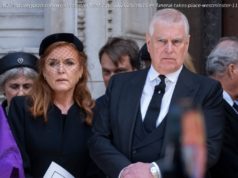SE Cupp and Rob Morrow, a conservative and a liberal, argue that standing up for human rights isn’t partisan, it’s American. President Trump should consider how his dismissal of the fate of Jamal Khashoggi will empower the forces of evil in the world.
At least for now, that punishment does not include withdrawing our official presence at Saudi Arabia’s Future Investment Initiative later this month. Secretary of the Treasury Steven Mnuchin has stated he still plans on attending.
But Trump’s latest statement is a welcome – if vague – shift in tone from earlier in the week when Trump seemed to dismiss his possible murder as not our problem . “It’s in Turkey, and it’s not a citizen, as I understand it. But a thing like that shouldn’t happen.”
The “thing” that shouldn’t happen, of course, is that a journalist was possibly the victim of an extrajudicial killing on foreign soil, at the behest of one of our allied partners, Saudi Arabia, according to US officials. The President’s words imply that somehow Khashoggi’s fate should be less horrifying because he wasn’t an American.
It’s admittedly naive not to acknowledge Saudi Arabia’s important role in fighting terrorism in the Middle East and providing stopgap protection against Iranian threats. But that this President seems to believe Khashoggi’s citizenship somehow diminishes our responsibility to strongly rebuke the kingdom is deeply disturbing.
Worse, the President’s cold calculation of the cost of action — “I don’t like the concept of stopping an investment of $110 billion into the United States,” he said of our arms trade with Saudi Arabia (which thus far has only earned $14.5 billion) — effectively puts a bounty on dissidents’ heads. For $110 billion in weapons, or far less, you can allegedly kill a dissident journalist without so much as a whiff of indignation from the US President. The quantifying of Khashoggi’s life is despicable.
It’s also signaling to the rest of the world that the United States will no longer lead when it comes to denouncing human rights violations, or holding the violators accountable, so long as the political or economic calculus favors silence or inaction. But being a shining beacon of democracy for the rest of the world should not only be the privilege but the obligation of our lifetimes.
From a genocide in Syria that’s claimed the lives of half a million people, to a staggering refugee crisis in Myanmar and protests and violence in Venezuela, there is a contagion of humanitarian crises sweeping the globe while the United States has receded into the background.
The ripple effect is that other countries feel emboldened to act out. Whether that’s in the case of Russia, which is widely believed to have extrajudicially murdered ex-spies; or in China, which abducts its own citizens — most recently an actress and an Interpol chief — before charging them with crimes after the fact; or in Egypt, where officials were accused of torturing, mutilating and murdering an Italian postgraduate student and dumping his body outside Cairo, to few if any repercussions.
How can we credibly profess our outrage at Russia, China, Egypt or anyone else when, just one year after the death of American college student Otto Warmbier after being imprisoned by the North Korean government, President Trump welcomed Kim Jong Un with open arms — and a commemorative coin — to a show summit in Singapore, where he heaped upon Kim the kind of lavish praise usually denied dictators who starve their own people?
Instead, brutal dictators, despots and war criminals are granted an open ear and open mind from President Trump. He extolls despots and dismisses our democratic allies as weak or unimportant.
This perverse affinity for strongmen limits America’s potential as well as democracy’s potential around the world. A strongman rules by fear — inherently viewing citizens as weak and governments as powerful. Democracy should be the opposite.
When America pays lip service but little more to horrors like the disappearance of Jamal Khashoggi, instead proclaiming convenient but arbitrary loopholes in our moral obligations, we just give the world’s worst bullies more ammunition and power.
There are no loopholes when it comes to basic human rights.
Every American, no matter his or her politics or point of view, knows our unique existential gift — we are our aspirations. So, with the world watching, the question is, to what do we aspire?






